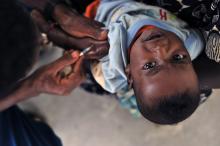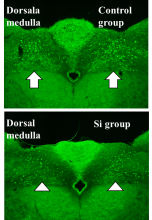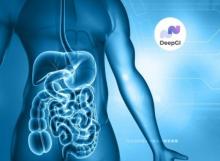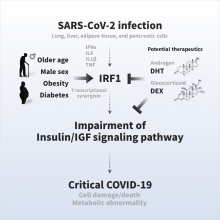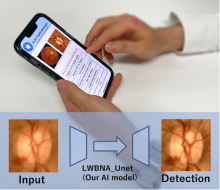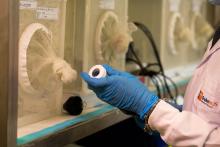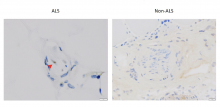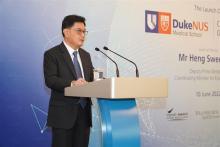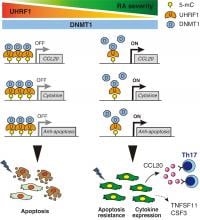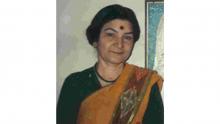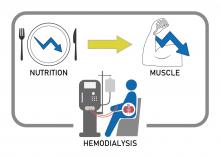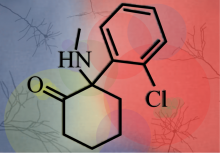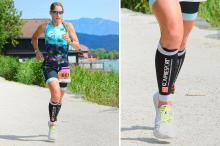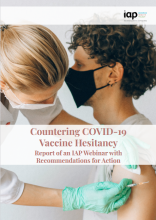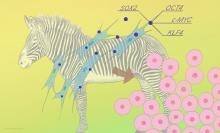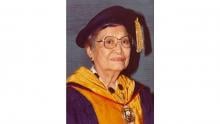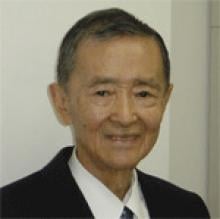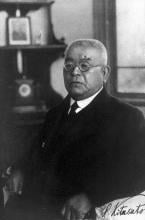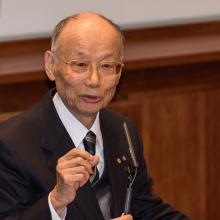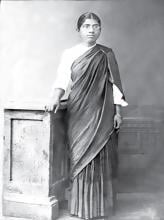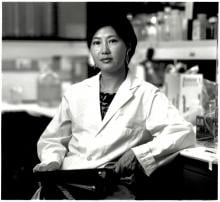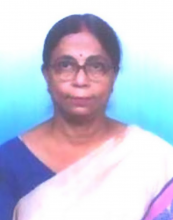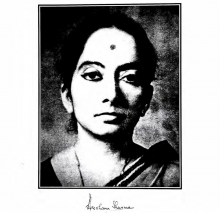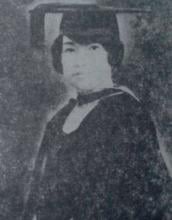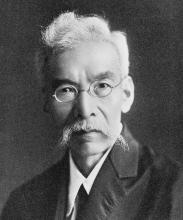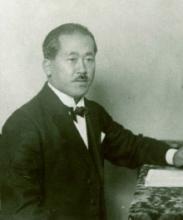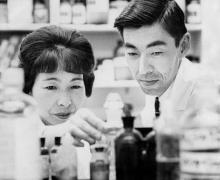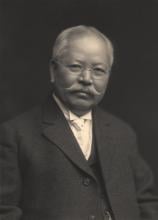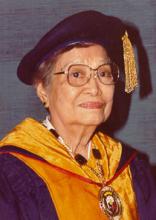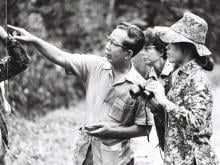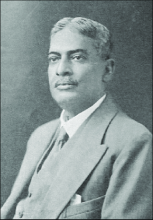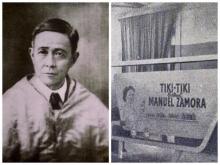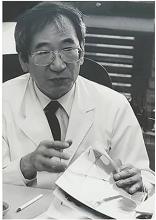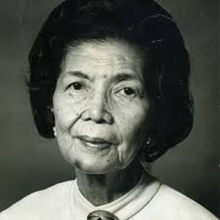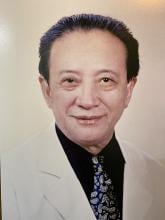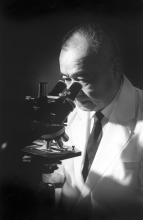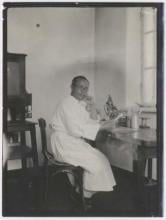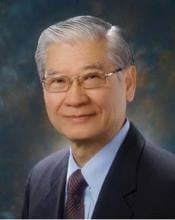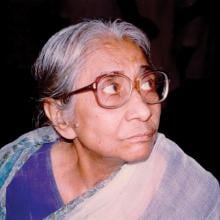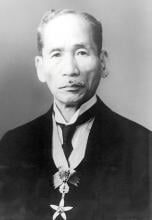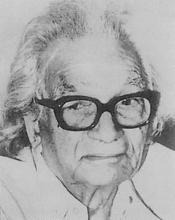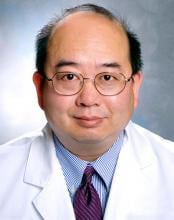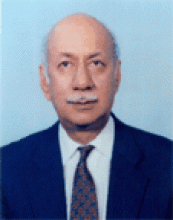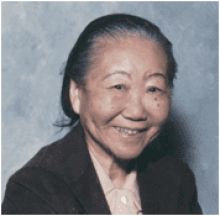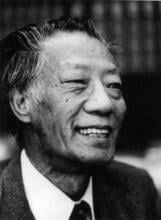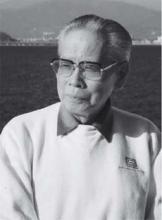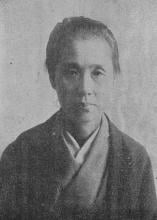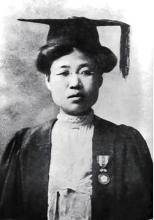Medicine
News
29 Jul 2022
Asia Research News monitors the latest research news in Asia. Some highlights that caught our attention this week are the discovery of an ancient palace that could be connected to Genghis Khan, the joy of letting your mind wander, and a wound dressing made from frog skin that promotes healing.
23 Jul 2022
Researchers create 'time machine' to study ancestor galaxies, Robotics engineers pay attention to matters of the heart, Custom suits for delivery worms, Tough, light structures with superior impact resistance and Virtual training can reduce stress and anxiety. Read all in the July's Editor's Choice plus op-ed: To boost South Korea’s basic science, look to values, not just budgets, this month's Image & Asia Research News 2022 magazine pick - Better memristors for brain-like computing.
22 Jul 2022
The World Health Organization (WHO) welcomes the launch by Gavi, the Vaccine Alliance, of the landmark opportunity for countries to apply for funding to introduce, or further roll-out, the RTS,S/AS01 (RTS,S) malaria vaccine.
22 Jul 2022
Osaka University researchers designed a silicon-based agent that successfully generated hydrogen continuously in the mouse gastrointestinal tract in an ulcerative colitis (UC) model. The hydrogen served as an antioxidant that could eliminate the reactive oxygen species shown to induce the chronic inflammation responsible for the damage and symptoms caused by UC. Mice given the agent had reduced hemorrhage, inflammation, and hyperexcitability in the brain area associated with visceral pain and discomfort. These results may help with the development of a novel treatment for UC.
15 Jul 2022
Cultured human skeletal muscle cells infused with serum from hibernating bears exhibited “muscle gain” confirming that these creatures’ ability to avoid muscular damage despite months of inactivity is in their blood.
05 Jul 2022
23 Gold awarded at MTE 2022: COVID-19 International Innovation Awards and Advanced Healthcare & Life Sciences International Innovation Awards
02 Jul 2022
An artificial intelligence (AI) algorithm trained to listen to patients pass urine is able to identify abnormal flows and could be a useful and cost-effective means of monitoring and managing urology patients at home. It is presented today at the European Association of Urology annual congress (EAU22), in Amsterdam.
01 Jul 2022
Specialised physician training, nurse-led motivational conversations and follow-up with patients, and subsidy on combination medication significantly lowered BP among patients with uncontrolled hypertension, according to findings from Singapore.
28 Jun 2022
Chula Engineering and Chula Medicine co-invent an innovative device for a rapid and accurate gastrointestinal cancer detection hoping to foster preventive medicine and reduce the number of cancer patients.
27 Jun 2022
Researchers from Osaka University have found that infection with SARS-CoV-2 activates the expression of IRF1, a key regulator of insulin/IGF signaling in multiple tissues, leading to disruption of blood sugar metabolism and, in some cases, new onset of diabetes. Treating infected cells with hormonal factors that decreased IRF1 expression enhanced insulin/IGF signaling, suggesting that this approach could be used to mitigate some of the more severe side effects of COVID-19 in the future.
24 Jun 2022
Automation in disease diagnosis is reliant on deep learning models that can accurately and efficiently identify measurements of tumors, tissue volume, or other sorts of abnormalities. Now, researchers from Tohoku University have unveiled a new, resource-light model capable of identifying many common eye diseases.
23 Jun 2022
Researchers from Osaka University have found that nematodes can be coated with a protective hydrogel sheath that can be engineered to carry functional cargo. This system could potentially be developed to deliver anti-cancer drugs to tumors using worms with a natural predilection for human cancer cells.
22 Jun 2022
New dinosaur species used claws to graze along the coast, More accurate rainfall predictions, Magnetism helps futuristic cell research, Do compression garments facilitate muscle recovery? Science journalism and why it matters for democracy and our Image of the month. Read all in the June's Editor's Choice and this month's Asia Research News 2022 magazine pick - Lessons from the dead.
21 Jun 2022
• The Satellite Center at Duke-NUS marks the latest achievement for the SingHealth Duke-NUS Academic Medical Centre’s vision for a Discovery District on its Campus.
• It is also the first Asia Pacific site in Johnson & Johnson’s network of research collaborations aimed at addressing endemic and emerging pandemic threats.
20 Jun 2022
Researchers in Japan outline preliminary research that could pave the way for a future test to diagnose ALS, a progressive disease of the nervous system.
11 Jun 2022
Duke-NUS is working with the Bill and Melinda Gates Foundation to develop the Asia Pathogen Genomics Initiative (APGI) to improve regional genomic surveillance and sequencing capacity. New Centre for Outbreak Preparedness will support APGI and work closely with national and global partners to enhance regional capacity to predict, prepare and respond to future health threats.
10 Jun 2022
SINGAPORE, June 9, 2022– Takeda Pharmaceutical Company Limited (“Takeda”) today announced that its dengue vaccine candidate, TAK-003, prevented 61% of symptomatic dengue cases and 84% of hospitalised cases with no important safety risks identified in the overall population.
07 Jun 2022
Potential of a novel therapeutic strategy for rheumatoid arthritis by UHRF1 stabilization
We identified an epigenetic regulator UHRF1 that suppresses various pathogeneses in rheumatoid arthritis. The UHRF1 expression level in synovium showed a negative correlation with the severity of pathogenesis in patients with rheumatoid arthritis and mouse arthritis models. In addition, stabilization of the UHRF1 expression achieved improvement of the arthritis pathology. Our results indicate that the stabilization of the UHRF1 protein is a potential therapeutic strategy for rheumatoid arthritis patients.
02 Jun 2022
Giants in History: Known for her pioneering contributions to bio-organic chemistry, Darshan Ranganathan (4 June 1941 – 4 June 2001) is considered India’s most prolific chemist.
01 Jun 2022
Scientists at Osaka Metropolitan University utilized a Japan-developed, objective, and simple nutritional indicator called the Nutrition Risk Index (NRI) to unveil a long-suspected yet unverified relationship between sarcopenia and malnutrition in end-stage kidney disease patients. Their findings confirmed that malnutrition contributes to sarcopenia, which can be detected through NRI.
30 May 2022
A research team led by Hong Kong Baptist University (HKBU) has found that a proteolytic enzyme called membrane-type 1 matrix metalloproteinase (MT1-MMP) plays an important role in the regulatory mechanism of fullness, or satiety, and it could serve as a promising potential drug target for the management of obesity.
25 May 2022
Among anesthetics, ketamine has a unique effect: it also acts as an antidepressant. A research team led by Osaka Metropolitan University Professor Makoto Kondo linked ketamine to brain regulation of IGF-1, which works independently of other ketamine-associated factors. The discovery may help untangle ketamine’s positive and negative effects, allowing future drug development to target IGF-1 directly.
23 May 2022
The antibiotic rifampicin is shown as a potential medicine for preventing Amyotrophic Lateral Sclerosis (ALS) and Frontotemporal dementia (FTD).
19 May 2022
Thought to enhance muscle recovery, compression garments are commonly worn by athletes and people engaging in exercise. Yet, an international research team’s systematic review provides evidence to the contrary.
13 May 2022
Molecular robots work cooperatively in swarms, LED lights made from rice husk, Muonic x-rays safely see inside samples, Making a luminescent material shine brighter and How to counter vaccine hesitancy, Read all in the May Editor's Choice and this month's Asia Research News 2022 magazine pick - Absorbing impact: Inside the Head of a Woodpecker.
27 Apr 2022
A new report by the InterAcademy Partnership (IAP) highlights practical recommendations for improving the uptake of vaccines.
25 Apr 2022
Examination of endangered species’ stem cells unveils ancient genetic links between mammals.
21 Apr 2022
Giants in History: The research of Filipino pharmaceutical chemist Luz Oliveros-Belardo (3 November 1906 – 12 December 1999) focussed on essential oils and other chemicals derived from native Philippine plants.
14 Apr 2022
Bacteria hitchhike on red blood cells, New model simulates effects of exercise on muscles, Argon found in air of ancient atmosphere and Revealing emergent elastic fields of chiral crystals. Read all in the April Editor's Choice and this month's Asia Research News 2022 magazine pick - Asia's race to outsmart antimicrobial resistance.
14 Apr 2022
Giants in History: Filipino chemist and pharmacist Manuel A. Zamora (29 March 1870 – 9 July 1929) is best remembered for his discovery of the tiki-tiki formula to combat beriberi, a disease caused by Vitamin B1 deficiency
Events
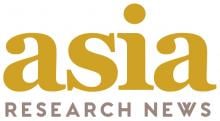
12 Jun 2007
Kuala Lumpur, Malaysia - Besides the participation of the OIC affiliated institutions such as the Islamic Development Bank, ISESCO, COMSTECH, various esteemed health-related international authorities and entities, namely the World Health Organization, UNICEF, CDC-US will also participate in this exclusive event.

09 Jun 2007
Bangkok, Thailand - Avian influenza and other emerging infectious diseases are of global public health concerns. This workshop will provide a platform for scientists in Thailand and the UK to discuss current issues and establish future research collaborations.

21 Jun 2007
Atlanta : This session will share the experience on possible resolution on the quality control, the interaction of botanical drugs with western medicine and the R&D strategy and the approval of the first NDA on botanical drugs in Taiwan.

02 Jun 2007
Shanghai, China - This symposium has as objective to provide participants with an insight into updated infertility management and a glimpse into the future. Participants will be provided with information on epidemiology of infertility in Asia and its impact on society and infertility service provided.

24 Jun 2007
Victoria, Australia : The themes are as broad or as narrow as you would like them to be: a tool to think about health, wellbeing, mobility in Asia and the Pacific.

27 Apr 2007
London - World renowned academics from Keio University and University College London will be presenting the latest advances in neuroscience research in this afternoon symposium. Attendance is free of charge.

02 Aug 2007
The Conference, themed Overcoming An Old Scourge With A New Face (HIV/TB Co-Infection) aims at highlighting the challenge of HIV/TB co-infection, and at the same time emphasising on the other core challenges of the TB control.

12 Jul 2007
A five-day congress with plenary sessions on the latest developments in the fields of bronchology and thoracoscopy, and educational thematic sessions.

23 Jan 2008
The aim of the Symposium is to stage a forum in which researchers and scientists working in the field of avian influenza can exchange information and experience, which could possibly lead to future research collaborations.

17 May 2007
The conference will highlight issues on Chinese regulation and infrastructure for clinical trials, Current status of regulation and clinical trials in Asian countries and Asian development strategy and clinical operations
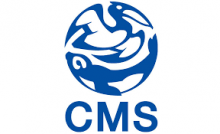
31 May 2007
Paris, France - This international event wil gather veterinarians, medical experts, government officials, scientists and economic decision-makers from countries all over the world touched by the spread of Avian Influenza.

21 Apr 2007
The Forum will offer a unique opportunity for leading regional and international experts to come together with a unified goal of addressing the specific issues surrounding the provision, and future needs, of effective cancer care in Asia. The Forum will focus on the ten most prevalent cancers in Asia-Pacific.

17 Mar 2007
Sagar (Madhya Pradesh), India - The objective of the proposed seminar is to disseminate and exchange the state-of-the-art knowledge in the field of pharmaceutical nanotechnology as a mean of treating the diseases through most efficient mode of controlled and targeted drug delivery.

14 Mar 2007
The International Conference in Quantum Bio-Informatics Center (QBIC) will be held at Noda Campus of Tokyo University of Science from March 14 to March 17, 2007

20 Mar 2007
Uttar Pradesh, India - According to WHO reports, the international market of herbal products is estimated to be US 62 billions. But there's a relatively lower share of medicinal and aromatic plants in agriculture systems. This seminar explores the reasons and finds solutions.

07 Mar 2007
Bangkok, Thailand - This event is held in conjunction with the 5th Southeast Asia Soyfood Seminar and Tradeshow.

09 Sep 2007
Taipei, Taiwan - The theme of the congress is "Diet, Nutrition and Optimal Health: From Food Supply to Nutrigenomics."

16 Apr 2007
Istanbul, Turkey - The theme of the conference is "Consequences and control of micronutrient deficiencies - Science, Policy and Programs - Defining the Issues

29 Mar 2007
The theme of the conference is "Current Concerns in Adolescent Nutrition". Topics that will be given particular attention include health problems affecting adolescent (e.g. obesity, diabetes, anemia), eating habits and sports nutrition.

01 May 2007
Nanjing, China - The workshop aims to be a highly communicative meeting place for researchers working on a wide range of biomedical topics.

05 Mar 2007
Kuala Lumpur, Malaysia - Despite some progress made in tackling the traditional OHS problems, the accident and fatality rate due to occupation is still high especially in developing countries. It is estimated that the risk of accident in developing countries is 10 to 20 times higher than the industrialised countries

08 Feb 2007
Bangkok, Thailand - Medical tourism is bringing a new breed of travellers. They have particular needs, they are going to these locations for a specific reason, and reports are showing that their daily spend is more than double that of other tourists.

30 Nov 2007
Unsustainable living, climate change and disassociation from nature are beginning to take their toll and disastrous repercussions for human health and survival are anticipated by researchers across the globe. The transdisciplinary nature of ecohealth is an innovative way of addressing these issues.

09 Mar 2007
The aim of the Course shall be to cover topics in core pediatric nephrology that are of practical relevance to pediatricians.

22 Jul 2007
As the fourth conference in the HIV Pathogenesis, Treatment and Prevention series, IAS 2007 will feature reports on the latest developments in the areas of basic, clinical and prevention science.

12 Feb 2007
The workshop will bring together leading investigators from industry, universities, as well as research institutes in Southeast Asia to present and discuss the use of various animal models including Drosophila, zebrafish, chick and mouse in their research.

15 Oct 2006
Training in good counseling skills is a priority to enable the infected learn how to live positively. Counseling is best done by those already infected. They have the experience of living with the virus themselves. What they need next are communication and counseling skills so as to reach those newly infected and affected.

24 Oct 2006
The objective is for the protein researchers to keep abreast with this rapidly growing area, and to promote exchange of knowledge and expertise among the protein researchers in Thailand.

02 Oct 2006
The field of bioinformatics has been a major part of drug discovery, with a key role in validating drug targets. This objective of this course is to introduce the participants to the current genomic information of insect vectors and to promote applications of bioinformatics and post-genomic tools in molecular entomology research.

18 Sep 2006
The aims of the initiative are to strengthen research capability of scientists in endemic countries and to promote application of bioinformatics in tropical diseases research.
Researchers
Sorry, no researchers coming up for this topic.
- « first
- ‹ previous
- 1
- 2
- 3
- 4
Giants in history
Michiaki Takahashi (17 February 1928 – 16 December 2013) was a Japanese virologist who developed the first chickenpox vaccine.
Irene Ayako Uchida’s (8 April 1917 – 30 July 2013) strides to understand genetic diseases such as Down syndrome paved the way for early screening of chromosomal abnormalities in foetuses.
Baron Kitasato Shibasaburo (29 January 1856 – 13 June 1931) was a Japanese physician and bacteriologist whose work led to a new understanding of preventing and treating tetanus, diphtheria and anthrax.
Maggie Lim (5 January 1913 – November 1995) was a Singaporean physician who promoted family planning and expanded the access to clinics to improve the quality of life for mothers and children in Singapore’s early days.
By isolating soil microorganisms and studying the compounds they produce, Satoshi Omura (born 1935) discovered almost 500 organic compounds with unique properties that were produced by these microorganisms, including many new antibiotics.
The founder of the Adyar Cancer Institute in India, Muthulakshmi Reddy (30 July 1886 – 22 July 1968), fought to uplift women and girls from impoverished situations.
Chinese-American virologist and molecular biologist Flossie Wong-Staal (27 August 1946 – 8 July 2020) was the first scientist to clone HIV and determine the function of its genes.
Maharani Chakravorty (1937 – 2015) was one of India’s earliest molecular biologists whose research paved the way for advances in the treatment of bacterial and viral infections.
Archana Sharma (16 February 1932 - 14 January 2008) conducted research into plant and human genetics that expanded the understanding of both botany and human health. In relation to botany, she uncovered the means by which asexually-reproducing plants evolve into new species.
The first Thai woman to receive a degree in medicine, Margaret Lin Xavier (29 May 1898 – 6 December 1932), is best remembered for her compassion towards her less privileged patients.
In 1915, pathologist Katsusaburo Yamagiwa and his research assistant Koichi Ichikawa became the first to prove that chronic exposure to chemicals can cause cancer.
In 1915, Koichi Ichikawa along with pathologist Katsusaburo Yamagiwa became the first to prove that chronic exposure to chemicals can cause cancer.
Husband and wife team, Kimishige (3 December 1925 – 6 July 2018) and Teruko Ishizaka (28 September 1926 – 4 June 2019) discovered the antibody class Immunoglobulin E (IgE) that triggers allergic reactions. They also discovered that IgE antibodies attach to white blood cells, known as mast cells, releasing histamine, which causes allergic reactions.
Husband and wife team, Kimishige (3 December 1925 – 6 July 2018) and Teruko Ishizaka (28 September 1926 – 4 June 2019) discovered the antibody class Immunoglobulin E (IgE) that triggers allergic reactions. They also discovered that IgE antibodies attach to white blood cells, known as mast cells, releasing histamine, which causes allergic reactions.
Japanese chemist Takamine Jokichi (3 November 1854 – 22 July 1922) founded the Tokyo Artificial Fertilizer Company, where he isolated a starch-digesting enzyme (named takadiastase) from the fungus Aspergillus oryzae.
Ground-breaking cancer researcher Kamal Jayasing Ranadive (8 November 1917 – 11 April 2001) advanced the understanding of the causes of leukaemia, breast cancer and oesophageal cancer through the use of animal models. She was also among the first to recognise how susceptibility to cancer is linked to tumour-causing interactions between hormones and viruses.
The research of Filipino pharmaceutical chemist Luz Oliveros-Belardo (3 November 1906 – 12 December 1999) focussed on essential oils and other chemicals derived from native Philippine plants.
Thai physician and conservationist Boonsong Lekagul (1907 – 1992) made major contributions to the preservation of his country’s wildlife.
Indian scientist and physician Upendranath Brahmachari (19 December 1873–6 February 1946) is best known for creating a drug called Urea Stibamine, used to safely and reliably treat visceral leishmaniasis (or Kala-azar), a severe infection caused by the Leishmania parasite.
Filipino chemist and pharmacist Manuel A. Zamora (29 March 1870 – 9 July 1929) is best remembered for his discovery of the tiki-tiki formula to combat beriberi, a disease caused by Vitamin B1 deficiency.
Korean parasitologist Seung-Yull Cho (16 November 1943 – 27 January 2019) is remembered largely for his pioneering works to control infections caused by helminthic parasites and his contribution to journal publishing.
Fe Villanueva del Mundo (27 November 1911 – 6 August 2011) was a Filipina paediatrician who founded the Philippines’ first paediatric hospital.
After witnessing death and suffering as a youth in his home village during World War II, Nguyễn Tài Thu (6 April 1931 – 14 February 2021) set his sights on alleviating pain by becoming a doctor. After studying Traditional Chinese Medicine in China in the 1950s, Thu returned to Vietnam to serve in military hospitals. Eventually, he became the country’s foremost practitioner of acupuncture, a technique he first learned by inserting needles into himself.
Minoru Shirota (April 23, 1899 – March 10, 1982) was a Japanese microbiologist who invented the popular fermented drink Yakult.
Wu Lien-teh (10 March 1879 – 21 January 1960) was a Malaysian-born doctor who invented a mask that effectively suppressed disease transmission. Winning the prestigious Queen’s Scholarship enabled Wu to become the first Chinese student to study medicine at the University of Cambridge.
David T. Wong (born 1936) is a Hong Kong-born American neuroscientist who is best known for discovering the antidepressant drug fluoxetine, better known as Prozac.
Indian organic chemist Asima Chatterjee (1917 to 2006) studied the medicinal properties of plant products, especially compounds known as vinca alkaloids.
Chika Kuroda (24 March 1884 – 8 November 1968) was a Japanese chemist whose research focussed on the structures of natural pigments.
Umetaro Suzuki (7 April 1874 – 20 September 1943) was a Japanese scientist best remembered for his research on beriberi, a disease caused by vitamin B1 deficiency, characterized by limb stiffness, paralysis and pain.
Salimuzzaman Siddiqui (19 October 1897 – 14 April 1994) was an artist and chemist from Pakistan whose research focused on natural products from plants.
Barry Paw (29 August 1962 – 28 December 2017) was a biologist and oncologist who discovered several novel genes and their functions in red blood cells.
Syed Qasim Mehdi (13 February 1941 – 28 September 2016) was a Pakistani molecular biologist who was a founding member of the Human Genome Diversity Project (HGDP), which assessed human diversity by studying human migration, mutation rates, relationships between different populations, genes involved in height and selective pressure.
Tsai-Fan Yu (1911 – 2 March 2007) was a Chinese-American physician and researcher who was the first female full professor at Mount Sinai School of Medicine. She discovered that gout, a condition characterized by the painful inflammation of joints, was caused by elevated levels of uric acid in the bloodstream.
Min Chueh Chang (10 October 1908 – 5 June 1991) was a Chinese-American biologist who studied fertilization in mammalian reproduction.
A Japanese surgeon, Tetsuzo Akutsu (20 August 1922 – 9 August 2007) built the first artificial heart capable of keeping an animal alive.
Ogino Ginko (3 March 1851 – 23 June 1913) was the first registered female doctor to practise modern medicine in Japan.
Esther Park (1877-1910), born Kim Jeom-dong, was the first female Korean physician to practise modern medicine in Korea and trained the first generation of Korean female doctors.




